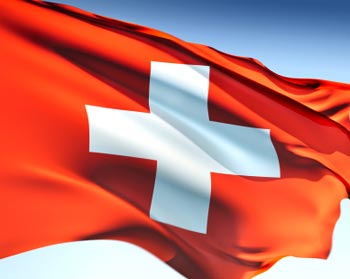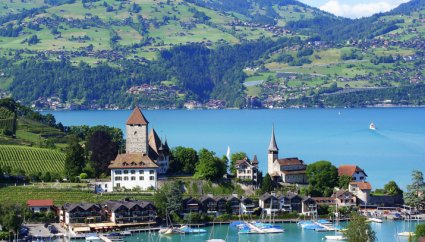Switzerland
Switzerland is a landlocked country in Central Europe. It has borders with France to the west, Italy to the south, Austria and Liechtenstein to the east and Germany to the north. The climate is temperate, but varies with altitude. Switzerland has cold, cloudy, rainy/snowy winters and cool to warm, cloudy, humid summers with occasional showers.
Switzerland is known for its mountains (Alps in south, Jura in northwest) but it also has a central plateau of rolling hills, plains, and large lakes. The highest point is Dufourspitze at 4,634 m while Lake Maggiore is only 195 m above sea level.
Switzerland's independence and neutrality have long been honored by the major European powers and Switzerland was not involved in either of the two World Wars. The political and economic integration of Europe over the past half century, as well as Switzerland's role in many UN and international organizations has strengthened Switzerland's ties with its neighbors. However, the country did not officially become a UN member until 2002. Switzerland remains active in many UN and international organizations, but retains a strong commitment to neutrality.
Switzerland showcases three of Europe's most distinct cultures. To the northeast is the clean and correct, 8-to-5-working, stiffer Swiss-German-speaking Switzerland; to the southwest you find the wine drinking and laissez-faire style known from the French; in the southeast, south of the Alps, the sun warms cappuccino-sippers loitering in Italian-style piazzas; and in the center: classic Swiss alphorns and mountain landscapes. Binding it all together is a distinct Swiss mentality.
Switzerland can be a glorious whirlwind trip whether you've packed your hiking boots, snowboard, or just a good book and a pair of sunglasses.



Education in Switzerland
Education in Switzerland is very diverse because the constitution of Switzerland delegates the authority for the school system to the cantons. There are both public and private schools, including many private international schools. The minimum age for primary school is about six years in all cantons, but most cantons provide a free "children's school" starting at four or five years old. Primary school continues until grade four, five or six, depending on the school. Traditionally, the first foreign language in school was always one of the other national languages, although recently (2000) English was introduced first in a few cantons.
At the end of primary school (or at the beginning of secondary school), pupils are separated according to their capacities in several (often three) sections. The fastest learners are taught advanced classes to be prepared for further studies and the matura, while students who assimilate a little more slowly receive an education more adapted to their needs.
There are 12 universities in Switzerland, ten of which are maintained at cantonal level and usually offer a range of non-technical subjects. The first university in Switzerland was founded in 1460 in Basel (with a faculty of medicine) and has a tradition of chemical and medical research in Switzerland. The biggest university in Switzerland is the University of Zurich with nearly 25,000 students. The two institutes sponsored by the federal government are the ETHZ in Zürich (founded 1855) and the EPFL in Lausanne(founded 1969 as such, formerly an institute associated with the University of Lausanne) which both have an excellent international reputation.
In addition, there are various Universities of Applied Sciences. In business and management studies, University of St. Gallen, (HSG) and International Institute for Management Development (IMD) are the leaders within the country and highly regarded internationally. Switzerland has the second highest rate (almost 18% in 2003) of foreign students in tertiary education, after Australia (slightly over 18%).
















